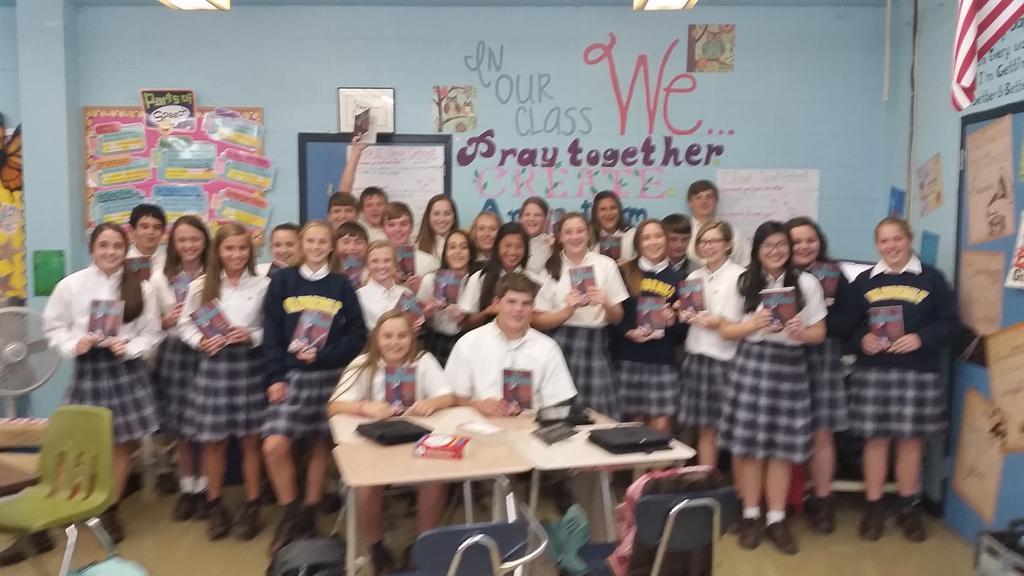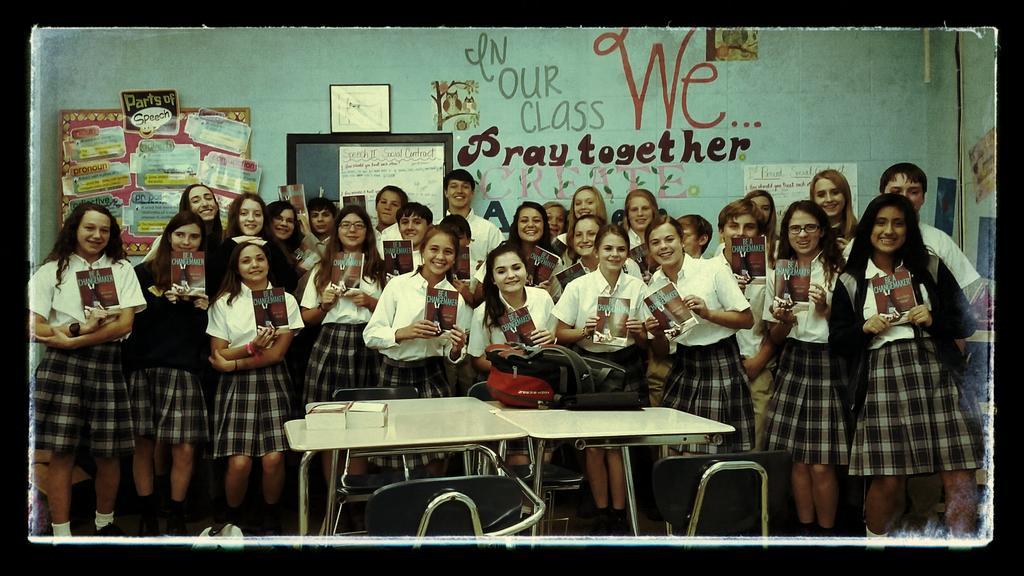In honor of Martin Luther King Jr. Day, here is one of my favorite quotes of his:
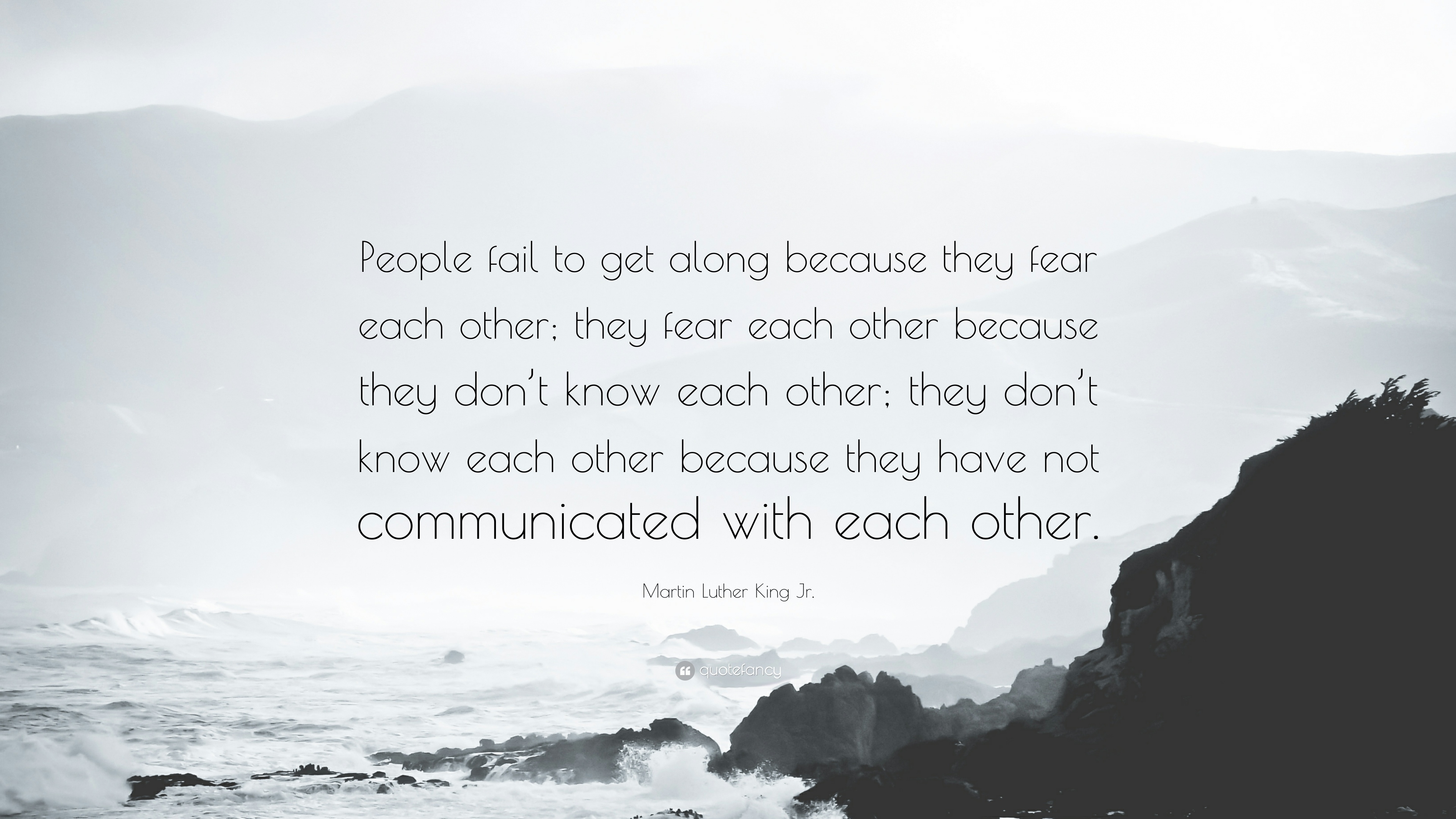
Please communicate. Talk and listen. Read and write. Think and feel.
Which leads us to another great MLK quote:
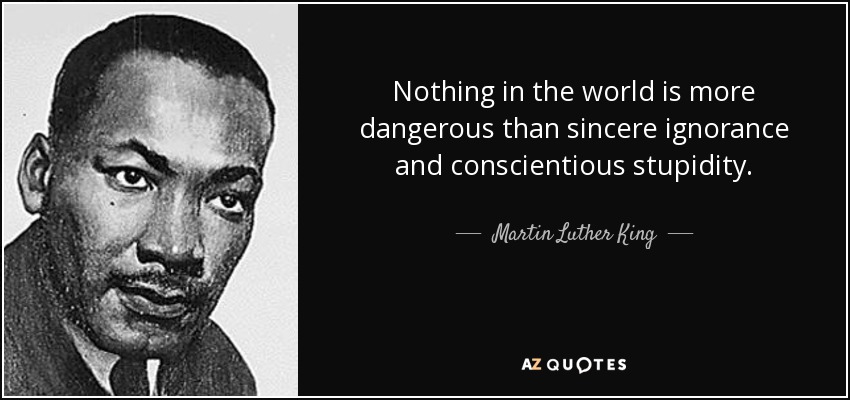
Never stop learning, folks.
I recently wrapped up what I think will be my last in-person school visits of the 2015–2016 school year, and promotion activities for the three books that are out is starting to die down. This seems like a good time to pause and reflect on my goals and progress, especially since I was too busy at the beginning of the year to do my usual review and planning exercises.
Since this time last year, I’ve done:
 1 high school presentation,
1 high school presentation,Not too shabby! It’s so easy in this business to feel like I never get anything done. I have a stack of in-progress manuscripts that I desperately want to perfect so they can go out and try to find their publishing homes, and every day that they don’t quite get there (or worse, don’t make any progress at all!) feels like a big fat failure. Listing out all of the things that I have done makes me feel a little bit better. I haven’t just been spinning my wheels, after all! I didn’t get to finish everything I had hoped to by now, but I did check off some big goals and also did a bunch of things I hadn’t expected or planned on. And, many of the things listed were firsts for me and/or major highlights, so there’s a lot of personal growth hidden in that list as well as some major accomplishments to be proud of. So, all in all, not bad!
Still, there’s so much more I want to do! My goals for the rest of the year include:
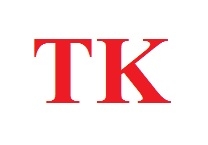 finishing up revisions for the first book in the Two Truths and a Lie series: It’s Alive!,
finishing up revisions for the first book in the Two Truths and a Lie series: It’s Alive!,There are several other manuscripts I hope to finish revising, as well as a handful of new ideas I’m really excited about researching further and beginning to write, but those will all just have to wait until I complete the above. Revision is one of those things that’s difficult to predict how long it will take, so I’m not sure if this list is even anywhere close to doable. I’ll check back in January to let you know how I’ve done! 🙂
The days are (finally) getting cooler and damper here in the Pacific Northwest and most of the kids are back in school, so it seems like a good time to reflect on the summer.
I typically don’t get to do much writing-related work over the summer, since the kids are home from school and the sun is shining, but this summer was filled with fun and exciting author events!
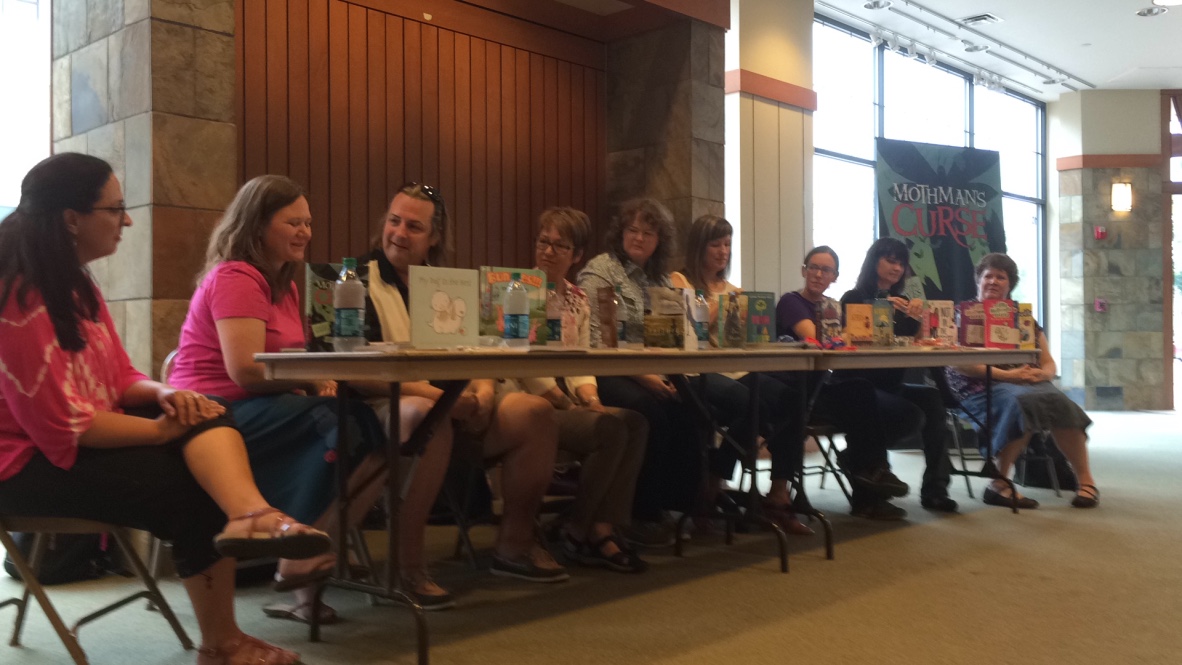 First, I got to participate in a huge author panel at Anderson’s Bookshop in Naperville, IL. The kids’ books extravaganza on July 11th included some of my best friends in the industry, including Christine Hayes, Ruth Barshaw, Lynda Hunt, Keyan Atteberry, Jennifer Chambliss Bertman, Tara Dairman, Janet Fox, and Amy Finnegan. It was even more wonderful because I got to meet the very special someone who wrote one of my all-time favorite reviews Emmanuel’s Dream, Keegan Knott, and it was her birthday, too! I got a hug. It’s a day I won’t soon forget, let me tell you. Thank you Anderson’s and Keegan for the wonderful memories! =D
First, I got to participate in a huge author panel at Anderson’s Bookshop in Naperville, IL. The kids’ books extravaganza on July 11th included some of my best friends in the industry, including Christine Hayes, Ruth Barshaw, Lynda Hunt, Keyan Atteberry, Jennifer Chambliss Bertman, Tara Dairman, Janet Fox, and Amy Finnegan. It was even more wonderful because I got to meet the very special someone who wrote one of my all-time favorite reviews Emmanuel’s Dream, Keegan Knott, and it was her birthday, too! I got a hug. It’s a day I won’t soon forget, let me tell you. Thank you Anderson’s and Keegan for the wonderful memories! =D
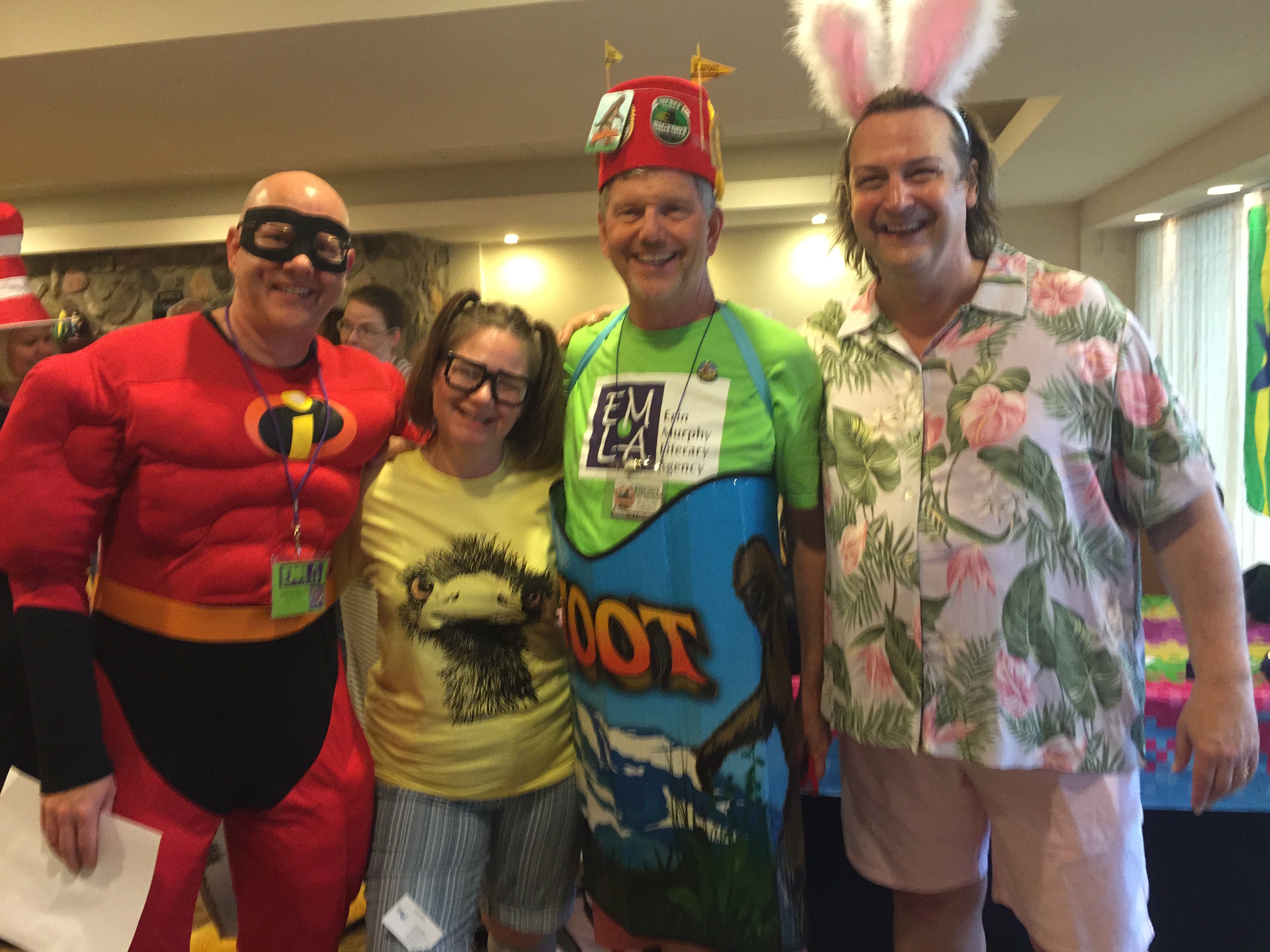 Next I headed to the Erin Murphy Literary Agency client retreat at The Abbey Resort at Lake Geneva. I can’t even begin to explain what a powerful, amazing this annual event is for me, and this year was no different. We do lots of fun, silly things like the costume party, but we also do a lot of learning, networking, sharing, connecting, growing, and more. I feel so blessed to be a part of this community!
Next I headed to the Erin Murphy Literary Agency client retreat at The Abbey Resort at Lake Geneva. I can’t even begin to explain what a powerful, amazing this annual event is for me, and this year was no different. We do lots of fun, silly things like the costume party, but we also do a lot of learning, networking, sharing, connecting, growing, and more. I feel so blessed to be a part of this community!
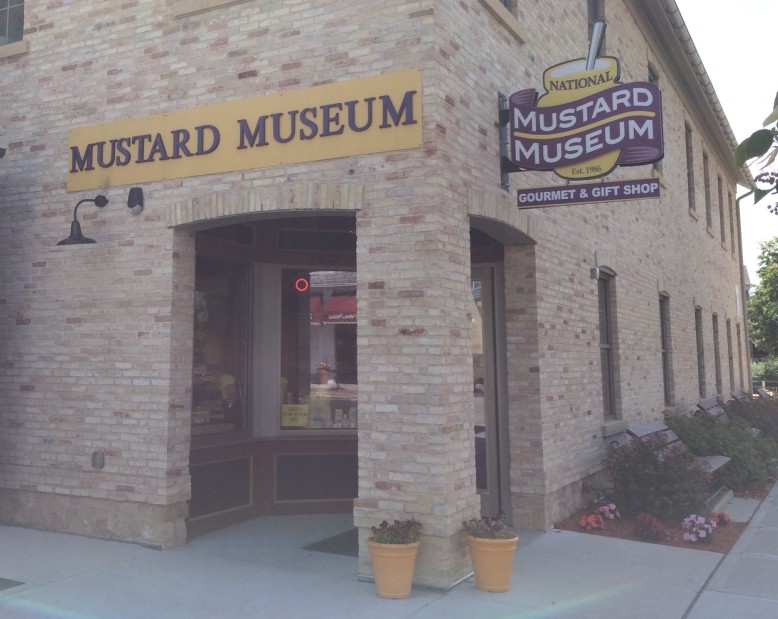

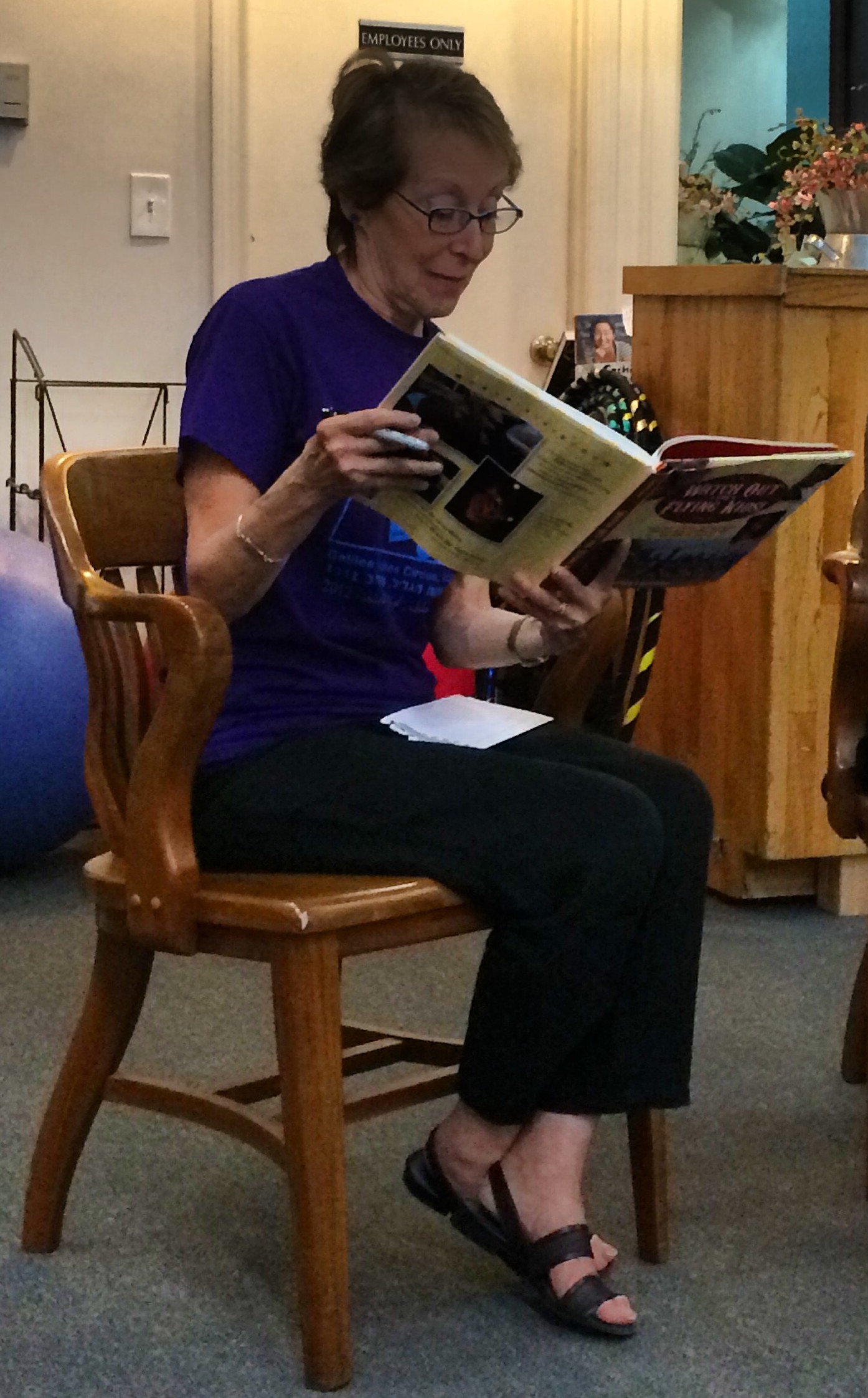 From there I continued on down to St. Louis to sign books at ILA and conduct a research trip. Our first stop was the National Mustard Museum.
From there I continued on down to St. Louis to sign books at ILA and conduct a research trip. Our first stop was the National Mustard Museum.
What am I researching there, you ask? Well, you’ll just have to wait and see! St. Louis was beautiful, ILA was a lot of fun, and I even got to go to
Cynthia Levinson’s book launch party for Watch Out for Flying Kids while I was there. Plus, the research trip was a huge success. I can’t wait to get back to work on that manuscript!
I had the opportunity to appear at several summer camps, including one on being a changemaker and another on early literacy, which I loved, and I did interviews on two different live radio programs.
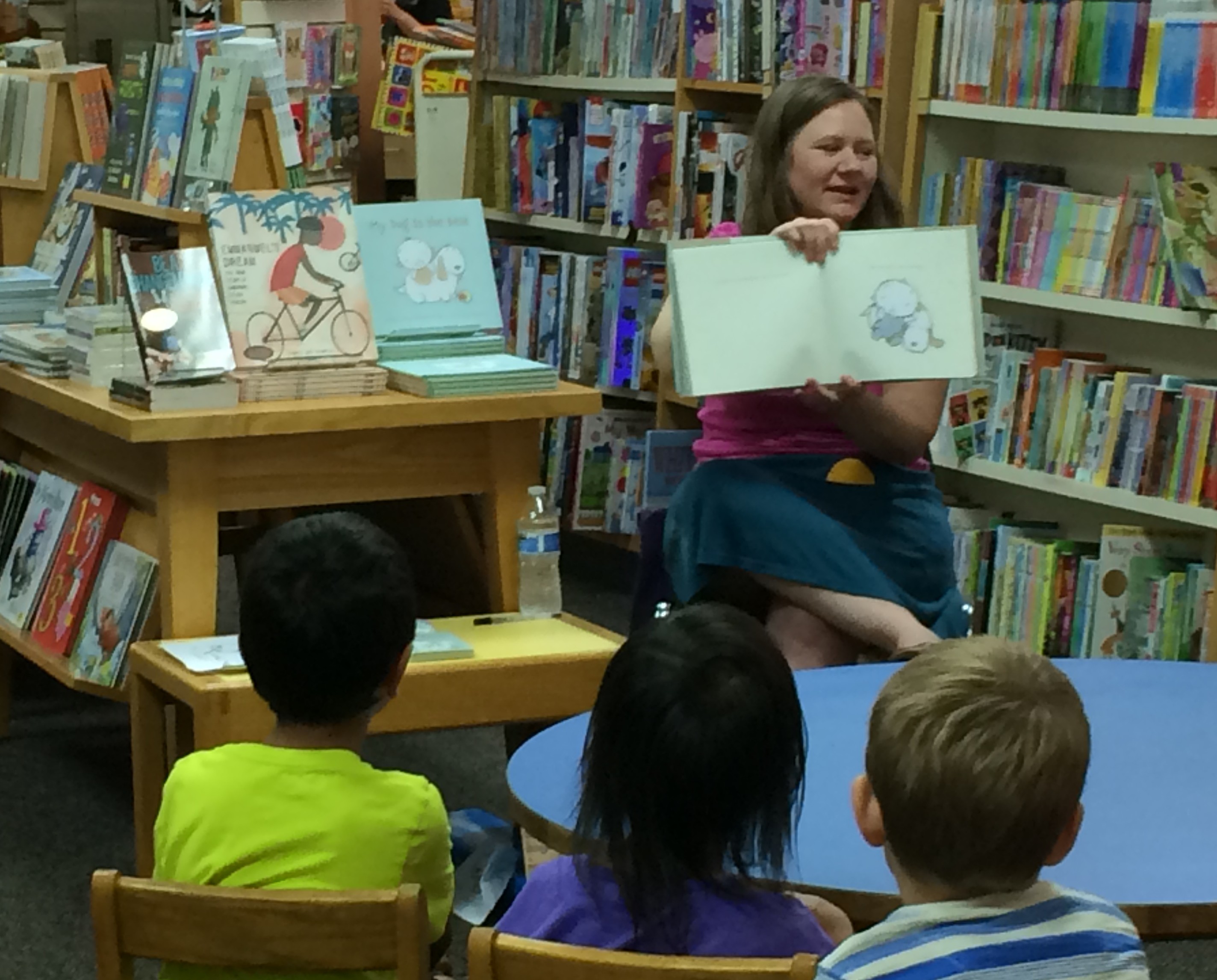 Last but certainly not least, I also spoke at the Pacific Northwest Library Association (PNLA) annual conference in Portland with two of my favorite nonfiction authors, Mary Cronk Farrell and Elizabeth Rusch, and I did my first storytime for My Dog Is the Best at University Bookstore in Bellevue.
Last but certainly not least, I also spoke at the Pacific Northwest Library Association (PNLA) annual conference in Portland with two of my favorite nonfiction authors, Mary Cronk Farrell and Elizabeth Rusch, and I did my first storytime for My Dog Is the Best at University Bookstore in Bellevue.
It was a busy, fulfilling summer, and now I’m looking forward to some quiet writing time!
I recently had the honor of being interviewed by Brooke Taylor on her inspiring radio show, A Special Connection on WHKW AM1220 in Cleveland, Ohio. Brooke just happened to have stumbled across one of my books at her local public library and was moved by it, so she reached out to me to talk about it.
The whole show is fantastic, but if you’re in a rush, we start discussing Emmanuel’s Dream: The True Story of Emmanuel Ofosu Yeboah at about the 31:58 mark, and Be a Changemaker: How to Start Something that Matters at about 45:37.
I hope you’ll enjoy listening!
https://soundcloud.com/living-the-word/a‑special-connection-with-brooke-taylor-july-25th-2015
What fun! Huge thanks to both Brooke and her producer, Brett Crowe, for making it such a pleasure.
I’ve got a couple more radio interviews in the works as well, so please stay tuned for more audio in the coming weeks!
As I’ve mentioned before, I love listening to podcasts. One of my favorites is The Artist Rolls.
On The Artist Rolls, Sean and Jamie ask their creative guests to fill out a form loosely inspired by character sheets from role-playing games like Dungeons and Dragons. They use these character sheets to help explore and discuss how each guest divides their time across the many different roles creative people must take on, what mediums they use to do their work, what their personal work style is, and how they view their own skill set. They incorporate dice to randomize the conversation, graphs to help visualize it, and humor and heart to bring it to life. It’s a fun way to learn about other people’s creative processes and challenges.

The Artist Rolls, Episode 26 — Laurie Thompson Reminds Us to “Do Unto Others”
Many people have asked me what they can do to help promote my book. Many others have already helped in ways both big and small, and I’m grateful for each and every one. If you’ve ever wondered how to help an author friend, here are some quick, easy things you can do that will have a big impact.
1. If you can, buy the book… for yourself and for others!
 Books make great gifts, so consider holidays, birthdays, and other celebrations as well as graduations, retirements, new babies, and other milestones coming up in the lives of your friends, family, teachers and coaches, and co-workers.
Books make great gifts, so consider holidays, birthdays, and other celebrations as well as graduations, retirements, new babies, and other milestones coming up in the lives of your friends, family, teachers and coaches, and co-workers.2. Help get the word out.
 Ask for help finding it on the shelf in bookstores and libraries, even if you already know where it is, so the booksellers and librarians will know where it is, too!
Ask for help finding it on the shelf in bookstores and libraries, even if you already know where it is, so the booksellers and librarians will know where it is, too!3. If you like the book, share your thoughts with others!

For the holiday 2014 season, bestselling author Neil Gaiman and musician-author Amanda Palmer called upon their fellow authors to get behind Indies First and “volunteer” at bookstores on Small Business Saturday (Nov. 29).
I couldn’t choose just one independent bookstore to hang out in (we’re lucky to have so many to choose from where I live!), so I’ll be doing two shifts:
I’ll be signing copies of BE A CHANGEMAKER and recommending a few of my other favorites, and I’ll be in great company with many other local authors and illustrators. So, if you’re in the area, please stop by and say, “Hi!”
If you’re not in the area, be sure to check out the interactive Indies First map to find a participating store near you!
Every now and then I stumble on something so wonderful that I want to add it my own list of “My Favorite Things” and share it with the world: the Let’s Get Busy podcast from Matthew Winner is one of those things. Whether you’re an author, illustrator, teacher, librarian, agent, editor, bookseller–if you have anything to do with children’s literature at all–this show is too good to miss. Think you don’t have time for podcasts? I listen while I’m in the car. Or while I walk the dog. Or while I clean the house. And, believe me, all of those tasks are way more enjoyable when you have Matthew and his guests with you!
Matthew recently recorded his 100th episode of the podcast, and he put together a massive blog and podcast tour to celebrate. Here’s where he’s been so far:
And I’m thrilled that today is my turn to host! Matthew was kind enough to answer a few of my questions, so we can all get to know him better.
LT: Hi Matthew, and welcome! I’ve already gushed to you about how much I love your podcast, but I’m curious to learn more. How and when did you first become interested in doing a podcast like Let’s Get Busy? How did you get started?
MT: I listen to a lot of podcasts. I mean, a whole lot of podcasts. All the time. When I’m driving to work. When I’m washing the dishes. When I’m shelving books. When I’m mowing the lawn. It’s the primary media I consume. The idea for doing a podcast of my own and, specifically, a kidlit podcast just sort of popped into my head one day, took up camp, and then wouldn’t leave. But it took a conversation with Travis Jonker (of 100 Scope Notes) to nudge me into actually starting it. He and I were talking one evening during an ALA conference in Chicago about how much we love the insights but also those memorable vignettes that inevitably stick in your brain whenever you’re in the company of authors or illustrators (or anyone who has something to say, for that matter). Travis asked me what my next big project would be and I told him that all I could think about was this idea of capturing these sorts of conversations through a loosely formatted podcast. Then he basically asked me when I was starting, and that was all it took.
LT: Sometimes we just need the tiniest nudge, don’t we? (Thanks, Travis!) You sure have been busy since then. I can’t believe you started less than a year and half ago, and you’re already up to 100 episodes!
LT: How much time do you spend on the podcast overall, and what’s the breakdown of how that time is spent (lining up guests, recording and editing, promoting, etc.)?
MW: Eeep. Let me try to make this as interesting as possible.
MW: I shoot for 30-minute recordings so that I’m able to post twice a week (or 8 episodes per month). A lot of this is based on bandwidth limitations and the cost of maintaining a subscription on Libsyn, a podcast host site. I usually talk with each guest for about an hour total and we spend the unaired time locking into a comfortable candor (or going on tangents and then saying, “Shoot! I should be recording this!”). Editing and prepping the accompanying blog post takes anywhere between 30 and 60 minutes. And coordinating schedules and review materials and recording logistics over email can take upwards of 30 minutes per scheduled guest, but that might be over a series of weeks.
MW: So, let’s see. That’s 25 minus the circumference of Y, carry the 3 and substitute 7 for X… about 2–3 hours per guest from first contact to published and promoted episode.
LT: That’s a big commitment (but less than I thought–you’re fast!). What then is the hardest part of doing the podcast, and how do you deal with that?
MW: The hardest part for me is asking new people to come on. It seems like everyone and their mother has a podcast nowadays, but I’m often the first podcast my guests have ever appeared on or, in some cases, listened to. And also, many of them have no idea who I am. That gets in my brain and makes me think all sorts of wonky things and then I start to psych myself out over sending that first contact email. I’ve coped with it by asking each of my guests, following our own conversations, to recommend a friend or colleague whom they think my be a good fit for the podcast or this interview format. It’s worked pretty well for me and my guest list now reads like one great big family photo album with all sorts of zigzagging connections between each of the faces.
LT: That is really neat to envision. So much of what we do is built on personal relationships, isn’t it? I don’t think you have anything to worry about, though. First, kidlit people are the best people in the world, don’t you think? And second, I’m sure most authors and illustrators are thrilled by the opportunity to chat with you: you’re interested in our work, and you give us a chance to talk about it. Just remember: we’re nice, and you’re doing us a favor. There’s no need to psych yourself out! 🙂
LT: What has surprised you most about the podcast?
MW: Everything surprises me about the podcast. Sometimes the thing that surprises me most is knowing that anyone’s actually listening. I learn something new with each new person who comes on and by rule of thumb I allow myself space to wonder, to be excited, to nerd out over process, and to ask whatever comes to mind. That approach has served me well and has led to a good deal of surprises when our conversations take unexpected turns. It’s how I learned that Laurie Keller (Arnie the Doughnut) plays banjo, that Nick Bruel (Bad Kitty) used to work at Books of Wonder, a landmark children’s bookstore in New York, and that Steve Light (Have You Seen My Dragon?) works with PreSchool students!
LT: I love that every episode feels like a casual conversation between friends, rather than an interview, per se. In fact, it’s my favorite thing about listening to them! What is your favorite thing about doing them?
MW: So, I have a blog called The Busy Librarian. I started it as a sort of advocacy blog for all of us teacher librarians who are all just so busy all the time. On October 10th, 2010, I published my first post. Here is the text in its entirety:
This is a blog for busy librarians.
For those of us who feel, well, overwhelmed.
It’s a place of comfort and, hopefully, a source of inspiration.
Here you will find the opportunity to interact globally and to impact locally.
We’ll synergize moments, ideas, and activities that will enable us to become more effective librarians, more efficient in our libraries, and more energetic with our students, without feeling like things are careening out of control.
So, let’s get busy!
It made perfect sense to me to name the podcast as an extension of the blog itself. Hence, Let’s Get Busy. My very good pal Sherry Gick, teacher librarian at Rossville Consolidated Schools in Rossville, IN, and author of the Library Fanatic blog, and Nikki Ohs Barnes, fellow Nerdy Book Club member and co-founder of the Virtual Book Club, met me at ALA where, just one night previous, Travis and I had talked about podcasting. Super excited to share, I told Sherry and Nikki that I was going to start a podcast and that I decided to call it Let’s Get Busy after my blog. They both immediately broke into what they decided would have to be the podcast sound effect… a sort of BOW-CHIKKA-WOAH-WOW that I have not to this day been able to get out of my head whenever I’m about to start an interview. Carrying those sorts of memories around everywhere I go is definitely my favorite thing. And with 100 episode behind me, I’m definitely carrying around a lot of stories!
LT: I’m sure you are!
LT: How do you feel your other activities (teaching, presenting, writing, blogging, Twitter, parenting, etc.) make the podcast better? And, vice versa, how does the podcast contribute to those other facets of your life?
MW: Oh my word! Everything and I mean EVERYTHING goes into the pot when it comes to making these recordings. Books from my picture book guests are typically already bedtime staples with our 4‑year-old son. Teaching and being a teacher librarian is the best and comes up over and over again on our chats because I like to share the way that the guests’ book is reaching kids and supporting readers in ways that I get to experience firsthand. Twitter is my professional learning community, but it’s also where I get to nerd out with friends over great kidlit and meet very cool people creating very cool books in the process, many of whom I’ll invite on the podcast because their work sticks with me.
MW: Doing the podcast brings me pure joy and is or has become a part of my identity. And I’ve gotten to meet a ton of really cool people in the process. I’m thankful that our son is growing up in a house surrounded with beautiful picture books, both on our bookshelves, and in frames hanging up throughout our house.
LT: Oh, I love that. Why have I never thought of framing picture books? (Hmmm… just in time for Christmas, too!)
LT: I’ve always said that I will know I’ve made it when I receive one letter from one child saying that something I wrote made a positive difference in his or her life. How do you define success? Do you feel like you’ve achieved it? If not, what’s left on your to-do list?
MW: I listen to my guests and I listen to my listeners. The podcast succeeds when the guests feel like they’ve found a home in our conversation and when the listeners feel like they’re in the room with us. I also try to take in the kind things people are saying about Let’s Get Busy or about me personally. Seymour Simon once told me that he thinks of me “like a son” and that he’s proud of me. I achieved all I ever wanted when I published the very first episode of Let’s Get Busy. And I’m thankful that so many people feel moved to tell me how the podcast is connecting with them. Success to me is knowing that one person cares about the thing you’re making, or saying, or creating. And I’m one person that cares a great deal about what I myself am making, saying, and creating. So with every episode I get to share, I’ve already achieved success before a single download occurs.
LT: What a wonderful attitude, Matthew! I care a great deal about what you’re making, saying, a creating, too. Thanks so much for sharing it with us !
As you can see from above, Matthew calls himself “the busy librarian” for good reason. Here are some of the places you can find more from him:
And be sure to follow the rest of the Let’s Get Busy podcast/blog tour, here:
I recently received this email from a middle-school teacher:
I wanted to let you know that one of my students has taken your book to heart. He’s been carrying it with him for six weeks, and he is in the process of trying to start a nature club at school. He is a super hard worker, and a wonderful, bright, sensitive 12-year-old boy–the type who might really make a dent in some of this world’s problems. He is passionate about this endeavor, but he doesn’t feel that he’s being taken seriously: adults are assuming he’s not going to work hard enough, he feels like things aren’t moving fast enough, and he’s disheartened. Still, he recently cited your book to me, saying, “She says sometimes it can take forever, and then sometimes things happen out of the blue,” so your words matter to him.
In the rush and hurry of getting through my inbox, this message brought me to a full stop. I’ve always said that I will feel like I’ve achieved success when I hear from one reader that my work mattered to them. Though not directly from the reader himself, this message from such a caring, dedicated, clearly amazing teacher on her student’s behalf feels every bit as wonderful. Reading this email was an even grander “first” for me than seeing my name in print for the first time, or holding the final book in my hands, or signing stacks of books at an event. This was a real connection with a young reader, a potential shift in the trajectory of this young man’s life that might not have occurred without my work. It’s both humbling and validating.
I have no doubt in the world that this student is indeed the type who might really make a dent in some of this world’s problems. It worries me, though, that even with this supportive teacher clearly on his side, he stills that one of the obstacles he faces is other adults assuming he’s not going to work hard enough. I mean really, what have we got to lose, adults? If they encourage him and he later quits, there’s no harm done: He feels valued and respected, he learns something about himself, and things go back to the way there were before. If they encourage him and he succeeds, the outcome really isn’t all that different: He feels valued and respected, he learns something about himself, and things get a little bit better.
I know that I’ve been guilty of similar reactions with my own children and their ideas. I’ve been too quick to point out what challenges I see and the reasons why their ideas might not be perfectly feasible. I questioned their long-term commitment to the projects they proposed. What I thought was helpful realism, however, wasn’t really that helpful at all. Indeed, what if my “realism” was actually cynicism, and maybe their “fantasies” could have actually worked? We’ll never know, because countless times I’ve inadvertently stopped them in their tracks before they even got started, all in the name of thinking things through and not embarking on something they couldn’t finish.
I think many of us (adults, especially, but kids, too) have become so goal-oriented that we don’t want to do or support anything that doesn’t seem very likely to succeed. We’re overly focused on the results, when so many of the potential benefits come from the process itself. We don’t want to waste time on something that might fail, but we forget that we learn by making mistakes.
If I’d focused on the likelihood of ever getting an email like this one, I would probably never have stuck with the process of honing my craft, revising my drafts, putting myself out there, etc. But if I hadn’t done that, I wouldn’t be the person I am today, and I wouldn’t have received an email from a teacher that brought me to tears.
I’m going to try to do better for my own kids and other young people I interact with, and I hope you’ll commit to trying to support the young changemakers in your life as well. Let’s value their ideas and intentions for what they are, and let go of our expectations or concerns over the results. I have no doubt that, given the right encouragement, they are all the types who might really make a dent in some of this world’s problems. And we need each and every one of them to try.
I’ve been hugely gratified by the responses I’ve gotten from teachers around the country about using BE A CHANGEMAKER: HOW TO START SOMETHING THAT MATTERS in their classrooms. The very first of these was a lovely 8th-grade ELA teacher from a private Catholic school in Louisiana. She reached out to me before the book was even released, and let me tell you, her enthusiasm was a much-appreciated soothing balm for all of my pre-release jitters!
She is using the book for her students’ “20% projects,” an idea adapted from the corporate world where companies allow employees to spend 20% of their time working on a pet project that interests them. They’ll be using the books throughout the school year to choose self-directed projects and bring them to life. Isn’t that exciting? I sure think so!
